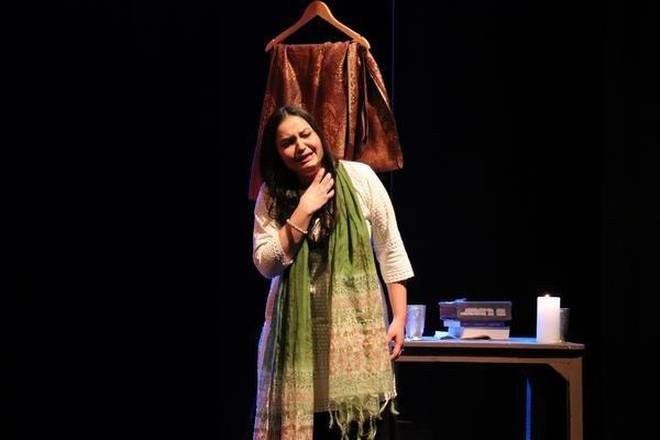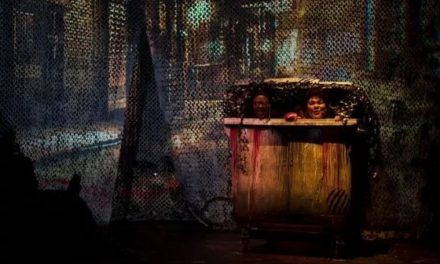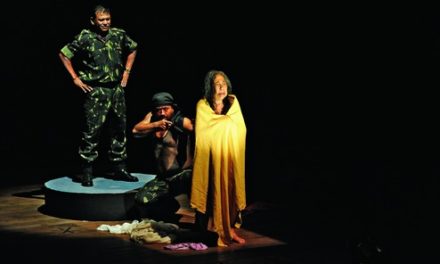Bharatmuni Rang Utsav saw some moving productions highlighting moral dilemmas and disturbing truths of our times.
For over a decade or so, Rajnarain Dixit has been exploring to adapt to stage significant contemporary Hindi novels by Kashinath Singh, Bhisam Sahni, Vibhuti Narain Rai and Rahi Masoom Raza. He is equally fascinated by the works of Ismat Chughtai, which are bold and progressive, indicating conservative Indian society. Once again, he has presented a new production based on her life and fictional characters titled Kaagazi Pairahan which was presented at Bharatmuni Rang Utsav at Shri Ram Centre organized by the Sahitya Kala Parishad to promote the solo theatrical art recently. His earlier version was a full-length play featuring a large cast. The latest piece is re-written to be performed by a solo performer. The present version under review is artistically satisfying. Solo performer Aryshri Arya brought vividly alive various facets of Ismat’s life and her time, a turbulent period marred by the tragedy of the Partition of India in 1947. The narrative is interwoven with facts from life, history, and characters from the fictional world.
Dixit has aptly used space suggesting various locales and different periods. Elegantly placed fabrics used by the performer from time to time reinforces the right mood. The off-stage music deepens the emotional impact on the audience. The video projection on the screen upstage depicts the terrible images of the tide of refugees and Jawaharlal Nehru’s historic speech: “Long years ago we made a tryst with destiny…” indicated the dawn of a new political era. This backdrop deepens the dilemma of Ishmat’s family about staying to their roots in the face of bloody communal riots.
Aryshri Arya as a solo performer creates stunning portraits of her character capturing myriad moods, stepping out from one portrait, entering the other effortlessly.
Senior citizen’s lament
Another significant play presented on the concluding evening of the festival was Khvab which was written and directed by Alok Shukla featuring solo performer Ramchander Singh, recipient of the Sangeet Natak Akademi Award for acting.
The play focuses on the sad plight of a senior citizen. The narrative traces the downward fall of an old man and his family. He has retired from service and is alone in his room, his wife has gone to meet a friend next door. He reflects on his past–got married, his young wife loved him. He thought himself to be the luckiest man on earth when he begot a son, dreaming that one day he will achieve a higher position, will marry and have a happy family life and in his old age look after him with love and care. As far as his dream about the success of his son came true but his son’s attitude towards him becomes indifferent, changing to cruelty, robbing him of his property by force.
Son’s cruelty is reflected in the way his living space goes on changing from a well-furnished room to a bare room with a scanty and dirty bed on the floor and empty bottle of medicine on a small table. The final stage of fall of the old man–he is condemned to stay in an old age home which is shown in a subtle way. The production is highly disturbing and shocking.
Mysterious ambiance
Herold Pinter’s one-act play Dumb Waiter in Hindi translation was presented under the direction of Dinesh Yadav with two characters. The play is set in a weird looking room in the basement. Two hit men have arrived in this room to accomplish their target. Based on the style of box set and the dark paint on the walls add to the mysterious kind of atmosphere of the room. To add to the mystery, a tray descends from the above containing some matchsticks.
Then this type of game of descending of the tray continues for some time. It appears that one of the characters is senior who is overbearing, constantly dictates his junior to perform odd work. The junior never tires to ask him questions and sometimes foolish ones. The senior reads a newspaper and tells his junior news items in a disinterested way. What adds to the mystery and a sense of fear in the atmosphere is the way a pipe runs from the basement wall to the upper unseen floor. This pipe is also used to give instructions by someone from above.
The characters are equipped with pistols, always alert and in combating position to annihilate their target. The dialogue is minimal. There are silent moments. In the stuffy ambiance, the characters keep on moving to different spaces giving the illusion that dramatic action is going on which will unfold something startling. The senior leaves his bed, moves to the wall where the pipe on the wall that reaches to the upper unknown place. He listens to the command possibly of a supreme authority to eliminate his target–his subordinate. Once again mystery surrounds why the subordinate is killed mercilessly.
The finely acted and directed production is viewed with a sense of fear and suspense. The production creates an abstract idea of human condition living in an era of betrayal in which unknown higher political forces are bent upon to destroy the happiness of humanity.
This article originally appeared in The Hindu on January 19, 2018, and has been reposted with permission.
This post was written by the author in their personal capacity.The opinions expressed in this article are the author’s own and do not reflect the view of The Theatre Times, their staff or collaborators.
This post was written by Diwan Singh Bajeli.
The views expressed here belong to the author and do not necessarily reflect our views and opinions.


















